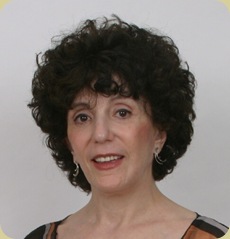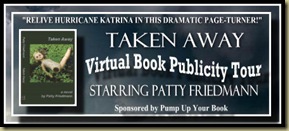Discovering new authors is part of the fun of blogging so it’s my pleasure to welcome ‘new-to-me’ author Patty Friedmann as she makes a stop on her virtual blog tour with Pump Up Your Book!
pleasure to welcome ‘new-to-me’ author Patty Friedmann as she makes a stop on her virtual blog tour with Pump Up Your Book!
 pleasure to welcome ‘new-to-me’ author Patty Friedmann as she makes a stop on her virtual blog tour with Pump Up Your Book!
pleasure to welcome ‘new-to-me’ author Patty Friedmann as she makes a stop on her virtual blog tour with Pump Up Your Book!Patty’s two latest books are a YA novel entitled TAKEN AWAY and a literary e-novel entitled TOO JEWISH.
Patty’s here to talk about ‘I’ve been everything but dead.’
I was doing a radio interview once in Madison, Wisconsin. Not bad for a girl from New Orleans. Unfortunately, I was actually in Madison, and it was a cold, gray autumn day, and I'd taken a long time walking to the studio, underdressed, chilled to the bone, and I wasn't in the right frame of mind to say the right things. I was promoting a book in which one of the three first-person narrators was a young black male. The interviewer lobbed a good one at me, asking if I thought I could succeed at authenticity with a different race and gender. "Well," I said, still shivering and not having much blood going to my brain, "Alice Sebold wrote from the point of view of a dead person, and she's never been dead."
The interview ground to a complete halt. He didn't like me. I could tell he wasn't going to air my interview. He asked me where I'd be appearing in Wisconsin, and then he said a polite thank-you-goodbye. I'd blown it. In retrospect, I think he was too, too serious. I think it was a funny line. He should have laughed. He should have liked me. But it was a university town, a public station. I don't play well in somber places.
I can't say I've done a lot of thinking since then about what a writer's boundaries are when it comes to getting inside characters' heads. I feel that I've been everything but dead.
Black?
Male?
Black male?
Male?
Black male?
 Why not? Writers have an empathy gene, and that means an innate capacity to relate what goes on in other people to one's own experience. I've lived in New Orleans long enough to have been in situations for long stretches when I'm the only white person. Everybody around me might see my color, but I can't see me. I pick up at least tiny fragments of shared experience--gender aside. I have no clue what it's like a hundred percent to be black, but I have enough puzzle pieces to build a character. The same is true of being male. I've been around enough of them. I've married far too many, reared and step-parented some I've wanted and some I haven't, and I've seen what's male in me and what's male in them.
Why not? Writers have an empathy gene, and that means an innate capacity to relate what goes on in other people to one's own experience. I've lived in New Orleans long enough to have been in situations for long stretches when I'm the only white person. Everybody around me might see my color, but I can't see me. I pick up at least tiny fragments of shared experience--gender aside. I have no clue what it's like a hundred percent to be black, but I have enough puzzle pieces to build a character. The same is true of being male. I've been around enough of them. I've married far too many, reared and step-parented some I've wanted and some I haven't, and I've seen what's male in me and what's male in them.I have to be careful with my characters because I want them to be real. I want them to speak the way they would and to think the way they would. I have eight novels under my belt, and so far I haven't heard one complaint--not from reviewers, not from readers.
So when it came to the challenge presented by the novel TAKEN AWAY, I had no fears. At least as far as the characters went. This was my first foray into YA fiction, and I was going to speak in the voice of a 15-year-old. Hey, I've been a 15-year-old. ("You were a 15-year-old on the ark," some are thinking.) I've reared two children intensely, one a girl, one a boy. I know everything, I say to myself. Actually, as far as I'm concerned, we're all versions of our 15-year-old selves; I just have to slice off any wisdom I may have accumulated along the way.
The character I created, Sumbie, was in a few ways like my now-35 daughter Esme, at least biographically. Esme was a deeply creative, sensitive, smart girl from a not-rich family who went to a private school for the insanely rich. That's where the similarity ends: Esme had an adopted baby brother she mothered like crazy; Sumbie is jealous of a baby sister who is lost in Hurricane Katrina, and her parents suspect her of having a role in the disappearance. Mixing Esme and myself up, as every mother does, I could put myself in Sumbie's place with no help. Emotionally. But when it came to creating a contemporary Sumbie, I needed Esme and her then-25-year-old brother as consultants. Not for character questions, but for technology issues. Not a big deal. Otherwise, I speak and feel 15.
I've done young. I've done male. I'm old enough to do old--if I thought anyone would be interested. I could go to another culture and immerse myself in it for a long time if I wanted to try to create a character from there. Though I would never presume to set a novel elsewhere. I'm a New Orleans writer, and I see too many people coming to New Orleans getting it wrong in novels, nonfiction, film, photography.
I can be anyone.
I even can be dead.
But as Bartleby said, I would prefer not to.
Patty, thanks so much for guest blogging today. You do make a good point about being careful with your characters because you want them to be real. From a reader’s view point, that’s an added bonus in a story.
Here’s a synopsis of TAKEN AWAY: When Summer Elmwood’s hot, bedraggled, exhausted family arrives unannounced at the door of her aunt’s elegant Houston house, her mother explains. “We’ve had a disaster. Not the hurricane, a real disaster.”
It is one week after Katrina laid waste to the Elmwoods’ hometown of New Orleans, and like most residents, they were too close to the tragedy to see its scope. Besides, they were coping with a possible tragedy of their own, and only because their city has closed down have they evacuated. Summer’s baby sister disappeared the day the storm hit.
Two-year-old Amalia Elmwood had open-heart surgery three days before the storm, and in the chaos—breaking windows, loss of power, rising water, departure of doctors and nurses—Amalia has disappeared from Intensive Care. The Elmwoods find themselves helpless to find her in an abandoned city.
When her parents start to suspect Summer—who aches for some positive attention—might be the culprit, Summer musters all her resources to track her sister down. With parents who don’t like technology, she must sneak to use computers and cell phones, but with the help of a friend, Haydn Glade, who also is exiled in Texas, she picks up clues that the FBI ignores and eventually figures out what happened. Haydn, whom she “would be in love with if I didn’t love him so much,” seems a much more romantic boy in Texas. Summer has to decide how much.
Now a bit of background on Patty. She is the author of six darkly comic literary novels set in New Orleans: The Exact Image of Mother (Viking Penguin 1991); Eleanor Rushing (1998), Odds (2000), Secondhand Smoke (2002), Side Effects (2006), and A Little Bit Ruined (2007) - all hardback and paperback from Counterpoint except paper edition of Secondhand Smoke from Berkley Penguin -; as well as the humor book Too Smart to Be Rich (New Chapter Press 1988).
Her novels have been chosen as Discover Great New Writers, Original Voices, and Book Sense 76 selections, and her humor book was syndicated by the New York Times. She has published reviews, essays, and short stories in Publishers Weekly, Newsweek, Oxford American, Speakeasy, Horn Gallery, Short Story, LA LIT, Brightleaf, New Orleans Review, and The Times-Picayune; and in anthologies The Great New American Writers Cookbook, Above Ground, Christmas Stories from Louisiana, My New Orleans, New Orleans Noir, and Life in the Wake. Her stage pieces have been part of Native Tongues. In a special 2009 edition, Oxford American listed Secondhand Smoke with 29 titles that included Gone with the Wind, Deliverance, and A Lesson Before Dying as the greatest ‘Underrated Southern Books.’ With slight interruptions for education and natural disasters, she always has lived in New Orleans.
For more on Patty and her writing, visit her website at www.pattyfriedmann.com.
If you’re a writer, what are your thoughts on creating characters? If you’re a reader, do you enjoy books where the characters seem believable and even remind you of someone you know?









Patty, thanks again for guest blogging. Wishing you much success with your writing.
ReplyDeleteWow, look at all Patty has accomplished! Great post, Patty. Now off to check out your site.
ReplyDeleteIf I were interviewing you, I would've laughed! I think we can gather enough to write about something or someone opposite from ourselves. One of the main characters in my next book is a woman, and I promise you, I've never been one!
ReplyDeletePatty, I loved this post!
ReplyDeleteAs a matter of fact, it was your title that drew me in.
Boo on that interview, the old stick in the mud.
You're my kind of writer. Wishing you much success.